UCalgary Palestine encampment's fate was sealed before a single tent was pitched, documents reveal
The Orchard has obtained hundreds of pages of correspondence from the university's executive leadership team, campus security, Calgary police and the provincial government. Part I of II.
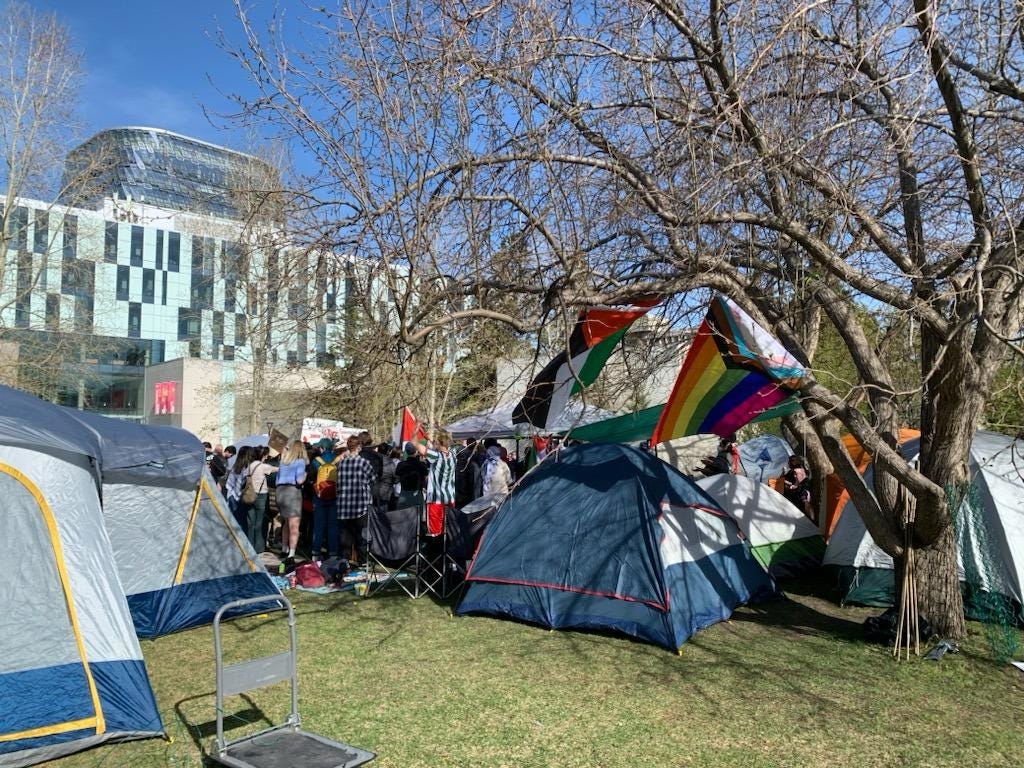
Tl;dr
Internal correspondences obtained through FOIP show that in the weeks leading up to the May 9 pro-Palestine encampment at the University of Calgary, administration worked to ensure it wouldn’t be permitted.
On April 29, the university issued a directive, which isn’t publicly accessible, that explicitly prohibited encampments and overnight protests, despite a long history of overnight encampment protests at UCalgary.
The university’s senior leadership team received an email from a pro-Israel lobbying group on April 30, which asked administration to “take all necessary measures to prevent an encampment at UCalgary.” This was the only external email in the FOIP package that received a personal response from president Ed McCauley.
An email from campus security to Calgary police reveals that the cops began setting up a temporary command centre at McMahon Stadium almost as soon as they arrived on campus, more than four hours earlier than was claimed in the university’s exculpatory third-party investigation.
Two days before the encampment, student groups wrote a letter to McCauley and VP (academic) Penny Werthner outlining a list of demands, including disclosing its investments and divesting from those connected to Israel, and academic and mental health supports for Palestinian students. McCauley didn’t respond until two days after the encampment was forcibly dismantled.
McCauley shared a National Post op-ed disparaging UCalgary and UAlberta law professors who criticized the universities’ response to their encampments with members of the executive team via email. VP (academic) Werthner called the article “excellent.”
In the early hours of May 9, 2024, a pro-Palestinian encampment was erected at the University of Calgary to protest Israel’s war on Gaza, which had killed at least 35,000 Palestinians, though medical experts would soon warn that the true figure was almost certainly far higher.
The UCalgary students and other community members involved in the protest were part of a broader movement at campuses across the United States and Canada calling for their institutions to disclose investments and divest from those implicated in Israel’s genocidal war.
These encampments lasted for varying amounts of time, but few, if any, were shorter lived than the one at UCalgary.
Before anyone had the chance to stay overnight, Calgary police officers stormed onto campus dressed like they were going to war. The cops violently dismantled the protest camp, firing 15 pepperball rounds and four pepper grenades at the participants and using a degree of physical force that gave at least two protestors traumatic brain injuries.
Shortly after the encampment was aggressively dispersed, the Orchard filed a freedom of information request with UCalgary, seeking all correspondence from May 1 to May 13 to and from the university’s executive leadership team, which consists of the president and seven vice-presidents, regarding the encampment.
In late January, this outlet received four tranches of internal correspondence, each about 200 pages long, including significant redactions and duplicates.
These documents show that, even before a single tent peg was placed in the ground, UCalgary administration’s intention was to make the encampment disappear.
As early as April 29, the university executive team issued a directive expressly prohibiting a campus encampment, which UCalgary law professors say constituted a substantial revision of existing policy.
The next day, the documents show, university leadership received an email from a pro-Israel advocacy organization demanding they prevent the establishment of an encampment, which received a personal response from university president Ed McCauley.
In the days leading up to the encampment, communications staff diligently scoured Instagram and Twitter for any indication of when an encampment might pop up at UCalgary. Once the encampment was established, social media monitoring intensified, with a significant portion of the FOIP documents consisting of screenshots of social media posts.
“What did they think we were doing there?” wondered local Palestine solidarity activist Wesam Cooley, with whom the Orchard shared the FOIP documents.
“I went to UofC. That was the best thing I've ever seen happen on that campus,” Cooley added.
“If it hadn't been cracked down on in the way it had, I think something pretty remarkable could have emerged out of that—like a hub of political and human rights, community building. But it wasn't to be.”
This story, which focuses on the university’s decision to ensure the encampment wouldn’t even last a day, is the first of two parts.
The second part, which will come out next week, focuses on how the university leadership, Calgary police and the Alberta government covered up police violence against the protestors.
UCalgary’s preparations for a potential encampment began in April 2024, as the pro-Palestinian student movement spread across the United States and Canada.
On April 30, an email was sent to UCalgary’s senior leadership team, with the subject: “Ensuring a Safe and Inclusive Environment for UCalgary’s Jewish Community.”
The senior leadership team appears to consist of the executive leadership, plus faculty deans, associate VP (diversity, equity and inclusion) Malinda Smith and vice-provost (student experience) Varity Turpin.
The identity of the email’s sender is redacted, but a May 10 “community bulletin” from the vociferously pro-Israel Jewish Federation of Calgary boasted that the group had been “in direct and timely contact” with university president McCauley, who assured them he “had a strong plan in place for the situation.”
The April 30 email referred to the alleged “presence of antisemitic actions and pro-terror activism” at the existing pro-Palestinian encampments at McGill University in Montreal and University of British Columbia in Vancouver.
“We ask that you take all necessary measures to prevent an encampment at UCalgary,” the pro-Israel group demanded 10 days before the UCalgary encampment was erected.
President McCauley didn’t respond to this message via email until the morning after the encampment was torn down, promising the pro-Israel group that the school “will continue to act quickly to address threats and ensure a safe environment”
“Please know that hate crimes and violence will not be tolerated,” McCauley wrote, ignoring the violence he unleashed on students less than a day earlier.
McCauley’s response to the pro-Israel organization was the only message included in the FOIP documents that the president sent to anyone outside the university.
The pro-Israel group’s framing of the encampments informed the way university leadership approached the issue from the outset.
The university’s preparations for the encampment would be undertaken strictly from the perspective of pro-Israel students and community members, with the presumption that any protest against Israel’s actions is by definition antisemitic and creates a hostile environment for Jewish people.
On the morning of May 2, UCalgary advisor for media, issues and outreach Brennan Black sent an email to the university’s executive leadership team, campus security and communications staff encouraging them to watch a 28-minute documentary recently posted to YouTube.
The video, entitled, “The Emergence of Jew Hatred Across Canadian Universities,” was uploaded by a group called Students Supporting Israel a day earlier.
In his email, Black noted that “UCalgary students are featured heavily throughout,” sharing timestamps of what he regarded as “notable quotes and moments.”
These include, in Black’s words, complaints of:
Pro-Israel students arriving on campus after Oct. 7, 2023 to find “rocks painted with the Palestinian flag;”
Pro-Israel groups getting “swarmed” when they table in the same building as pro-Palestine activists;
A pro-Israel student writing a news report for local student newspaper The Gauntlet about Israel and Gaza that “was edited to look pro-Palestinian;”
The UCalgary chapter of Students Supporting Israel being “given frozen status” and a “formal warning” after being “accused of harassment while tabling;” and
A person who’s not Jewish claiming to have “gotten death threats” for being pro-Israel.
At no point does Black suggest these accusations warrant further investigation. They’re simply accepted as undisputed fact.
The Orchard previously reported on internal documents revealing the deliberations that went into the University of Alberta’s decision to invite Edmonton police officers to tear down its encampment on May 10, a day after campus security described it internally as “extremely peaceful.”
While UAlberta administration initially took a more hands-off approach to its Palestine encampment, the documents obtained from UCalgary show the administration adopting an obstinate zero tolerance approach to encampments.
In an email sent about three hours after the encampment setup, UCalgary VP (services and operations) Mike Van Hee, who co-chaired the crisis management team with VP (academic) Penny Werthner, established the administration’s mantra for dealing with the encampment for the rest of the university’s senior leadership team: “you are free to protest but you are not free to set up encampments [bold in original].”
“The individuals involved have been advised, and provided documentation, that temporary structures and overnight protests are not permitted,” Van Hee added. “The University of Calgary is working in coordination with the Calgary Police Services who have also been onsite this morning.”
Katy Anderson, a UCalgary PhD student in Communications and Media Studies who helped organize the encampment, said she and other students arrived on campus around 6:15 a.m. to start setting up the encampment.
Within 15 minutes, campus security arrived, issued trespass orders and called the police, who arrived within an hour.
She said the encampment organizers didn’t expect the university to tolerate the encampment for long, given how “beholden to corporate interests” UCalgary is.
But neither did they anticipate the level of violence the university was willing to unleash on its students, added Anderson.
In addition to the documents the Orchard obtained from UCalgary, writer and activist Euan Thomson, who was assaulted by Calgary police at the encampment, obtained all correspondence between the cops and campus security from May 9, which he provided to this outlet.
At 7:15 a.m., Rick Gysen, UCalgary’s director of campus security, sent an email to Sgt. Quentin Blindenbach, Detective Zain Kelly and Sgt. Dan Kim of the Calgary Police Service (CPS) Emergency Management Unit to let them know that the encampment had been set up in the quad, with 12 to 15 tents, more than 20 people, wooden pallets and signs.
Gysen added that CPS District 3 was “gathering in at the stadium, not sure what the plan is,” referring to McMahon Stadium, which was used as a makeshift CPS headquarters during the encampment.
An exculpatory third-party review of the university’s handling of the encampment conducted by accounting firm MNP claims that while CPS officers arrived on campus around 7:30 a.m., they didn’t establish a command centre at McMahon until 11:30 a.m.—more than four hours after the director of campus security reported to police that the local district was “gathering in at the stadium.”
This basic factual inconsistency is one of several reasons that UCalgary law professors Jonnette Watson Hamilton and Jennifer Koshan recently characterized the MNP report as “thin gruel,”
To Thomson, the early morning exchange between UCalgary’s Gysen and the CPS reveals that the university had already decided “that if an encampment went up, they were going to allow Calgary police to deploy a massive number of cops to remove that encampment, and that they were going to do it immediately.”
Which university policies did the encampment violate that warranted such a heavy police presence?
This wasn’t immediately apparent to UCalgary director of government relations Candice Laws.
VP (communications and community engagement) Corey Hogan, whose name you might recognize from the popular podcast The Strategists, clarified in a May 11 email to Laws that the protestors had violated the Use of University Facilities for Non-Academic Purposes Policy (Facilities Policy), Special Events Program and an ELT [Executive Leadership Team] directive.
Hogan also noted that the UCalgary Statement on Free Expression, which it adopted in 2019 under UCP pressure, notes that the university can “reasonably regulate the time, place, and manner of expression to ensure that it does not disrupt the ordinary activities of the institution.”
The Facilities Policy and Special Events Program each detail the steps required to obtain university approval for extra-curricular events on campus.
The ELT directive, dated April 29, 2024, stated explicitly that the university wouldn’t approve “temporary structures” on campus, which Hogan claimed was done simply “to clarify existing policies.”
He attached the updated May 3 version of the directive, which specified that protests wouldn’t be allowed on campus between 10 p.m. and 8 a.m., rather than the original’s blanket ban on “overnight protests,” removes the “right to protest” and adds “the freedom to critique and contest the expression of others.”
“Failure to follow these policies and directives,” the document warned, “may constitute non-academic misconduct (students), cause for disciplinary action (staff) and/or grounds to be trespassed from the University of Calgary’s premises (all).”
This directive preemptively banning encampments was emailed to students on May 3. Campus security mistakenly handed out the original April 29 draft to encampment protestors on May 9.
In a Nov. 5 Ablawg article, UCalgary law professors Jonnette Watson Hamilton and Shaun Fluker argue that this directive is “not a lawful exercise of authority by the University of Calgary,” and is therefore “unenforceable.”
Watson Hamilton and Fluker note that while the directive may have been sent to students, it isn’t published anywhere, contrary to the university’s Procedure for Developing Policies and Procedures, and it’s unclear who wrote and approved it.
“It is a basic principle of administrative law, the rule of law, and procedural fairness that people must know the rules that govern their actions,” they wrote.
Contrary to Hogan’s assertion, the law professors argue that the directive “substantially amends” the Facilities Policy, which outlines a detailed list of activities prohibited on campus, none of which have anything to do with “temporary structures.”
Katy Anderson noted that encampment protests are somewhat of a UCalgary tradition, with students camping out in the university quad to protest tuition increases and housing insecurity in 1999, 2003, 2006, 2007 and 2008.
“I’ve stayed overnight in a tent at the University of Calgary before,” said Anderson, who also did her bachelor’s and master’s degrees at UCalgary.
The narrative that the university and police disseminated on May 10 was that police asked the protestors to disperse and, while most did, a few refused to leave, forcing a three-hour standoff with protestors that began around 8:30 p.m.
“This isn’t something we enjoy doing,” said police chief Mark Neufeld at a news conference the day after the encampment was dismantled. “It is something that is very necessary when individuals refuse to comply with lawful direction.”
Wesam Cooley arrived in the evening and served as one of the encampment’s police liaisons, told the Orchard that Neufeld’s account, which was echoed by president McCauley, is a “fantasy narrative.”
Cooley said he had negotiated the encampment’s takedown with the police, going back and forth between them and the students about every 15 minutes.
“Every single tent had been dismantled,” he said in an interview, adding that the only delay was packing all the camping supplies into a moving van, which couldn’t enter the quad because police had blocked all the roads.
When he told the officer he was negotiating with the issue, the cop said they would just have to take their supplies by hand, giving them a final deadline of five minutes.
“There's a line of protesters standing face-to-face with the police chanting, but they're not doing anything. Behind them, the entire encampment’s being taken down,” Cooley recalled.
He provided the Orchard with a video taken immediately before and during the cops’ assault on the protestors, which occurred around 11 p.m.
“You’re out of time, Mr. Cooley,” an officer says about five seconds into the video as protestors stood facing the officers while singing the African-American hymn, “We Shall Not Be Moved.” Two of these protestors were Katy Anderson and Euan Thomson.
“We have given you enough time to move off the university campus,” another officer announces through a megaphone.
Around 48 seconds in, the cops begin marching towards the students, chanting move in unison and, according to Cooley, “bashing us” with their shields, “then the pepper balls come out and from that point, it just devolves.”
A minute later, the video screen goes black with audible screams in the background.
Thomson, who had been at the encampment on and off since around 9:45 a.m., told the Orchard that he got punched in the face three times by an officer who was wearing what felt like weighted-knuckle gloves, leaving Thomson with a concussion.
After he got up, another officer whisked him away to their makeshift command centre and wrote him a trespassing ticket.
“They just dumped me at McMahon [Stadium], gave me the ticket and sent me away. Nobody even asked me if I was OK, and I was visibly bleeding from the face,” said Thomson.
Anderson said that once the police charged, she “got hit on the head immediately, extremely hard,” causing her to leave campus with a concussion.
“I wasn't prepared to be physically assaulted by the police at the behest of the university where I've spent my academic career,” she said.
In a May 10 news release, president McCauley boasted that there were “no injuries” from the encampment raid, citing assurances from police.
On the evening of May 7, two days before the encampment, a coalition of groups sent a petition to president McCauley and VP (academic) Penny Werthner, who also served as interim provost, demanding that UCalgary:
disclose and divest,
commit to an academic boycott of Israeli universities,
adopt a definition of anti-Palestinian racism and implement a zero-tolerance policy for it,
provide the same mental health and academic supports for Palestinian students that it does for Ukrainian students, and
condemn Israel’s genocidal war in the same way McCauley unequivocally condemned the Hamas-led Oct. 7, 2023 attacks on Israel.
The nine signatories were the Palestine Advocacy Club, Arab Student Network, Muslim Student Association, Muslimah Empowered, Pakistani Student Society, Communist Revolution, Youth Lifting Youth, Food Justice Now, and the UCalgary chapter of Kiwanis International.
McCauley didn’t respond until May 11, with a letter claiming that his office had been in the process of “confirming it came from the clubs listed (as it came from an unknown gmail address) and confirming details of our response when, as you know, an encampment was established in the early hours of May 9.”
“We wish you had provided more time - or at least a request for a meeting or clear sense of your expectation for when a response was to be delivered - before such a dramatic escalation,” the president wrote in a letter that was approved by Hogan.
McCauley told the students that some of their demands are “within the purview of the administration” while others are the Board of Governor’s responsibility, asking the groups for “contacts to engage with.”
“I know these have been a difficult few days, and I know there are decisions we made with which you disagree. While we will continue to enforce university rules to ensure the safety and operation of our campus, we want to engage,” McCauley wrote.
When dozens of alumni wrote to the university to express their disappointment in how the university handled the encampment, with many pledging to withhold future donations, senior director of alumni engagement Colleen Bangs sent each of them an identical email repeating the president’s talking points nearly verbatim.
The one exception was in response to a May 13 email from an alumni who wrote: “Until UCalgary makes a true commitment to listening to the students and to ensuring this never happens again, I do not feel comfortable with my likeness being associated with the university or any of its marketing [bold in original].”
Two days later, Bangs wrote that she felt obliged “to send a personal response.”
“You have generously shared your … knowledge with the university on many occasions and always represented our institution in a way that makes us proud,” Bangs wrote. “I am sorry for the way that the actions and images from May 9 made you feel, both personally and about the university.”
On May 14, law professors from UCalgary and UAlberta wrote an open letter to the presidents of their universities, the Calgary and Edmonton police services, and the Alberta Crown Prosecution Service arguing that the universities and police forces violated the encampment protestors’ Charter rights.
“We are further concerned by the excess force and violence with which the Calgary Police Service and Edmonton Police Service cleared the camps,” they added. “Video evidence suggests that police officers used force that went far beyond that which was necessary to effect law enforcement purposes.”
In response to the law professors’ petition, National Post comment editor Carson Jerema wrote a May 15 column, headlined, “Ignore left-wing 'experts,' there is no right to camp on university property.”
That evening, president McCauley emailed a link to the column to senior advisor John Kincaid, university lawyer and VP (people and culture) Jacqueline Lacasse, Hogan, and Werthner.
Academic VP Werthner’s response to Jerema’s explicitly anti-intellectual diatribe was one word: “Excellent.”
UCalgary communications director Dean Parthenis acknowledged the Orchard’s request for comment, but said he might need more time than the deadline provided.
A followup email sent four days after this story was first published received an automated response: “Thank you for your inquiry. Dean Parthenis is no longer at the University of Calgary.”
Read Part II:
I’ve included the FOIP documents from UCalgary below for your reading pleasure. If there’s anything important that you think I missed, let me know.
Edited by Roberta Lexier
This piece has been updated to correct the time the stand-off with the encampment began and ended.
This piece has been updated to reflect the fact that Dean Parthenis no longer works at UCalgary.




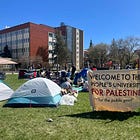
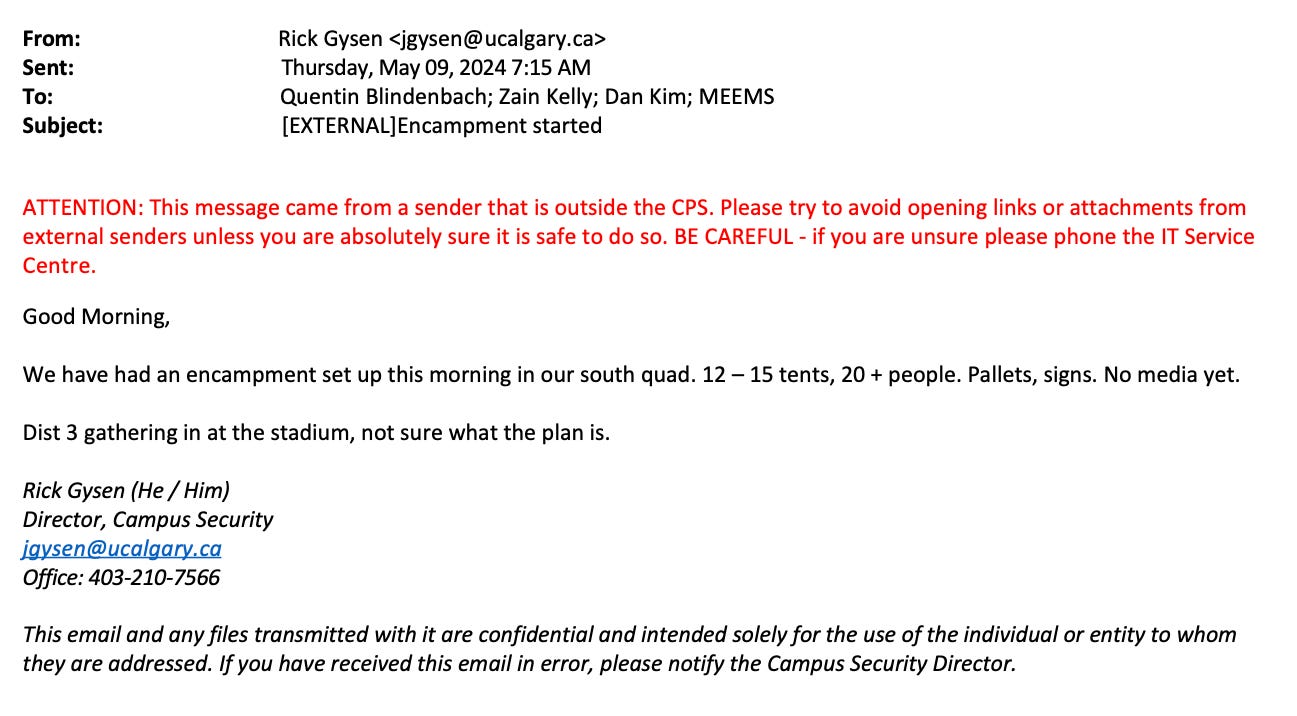

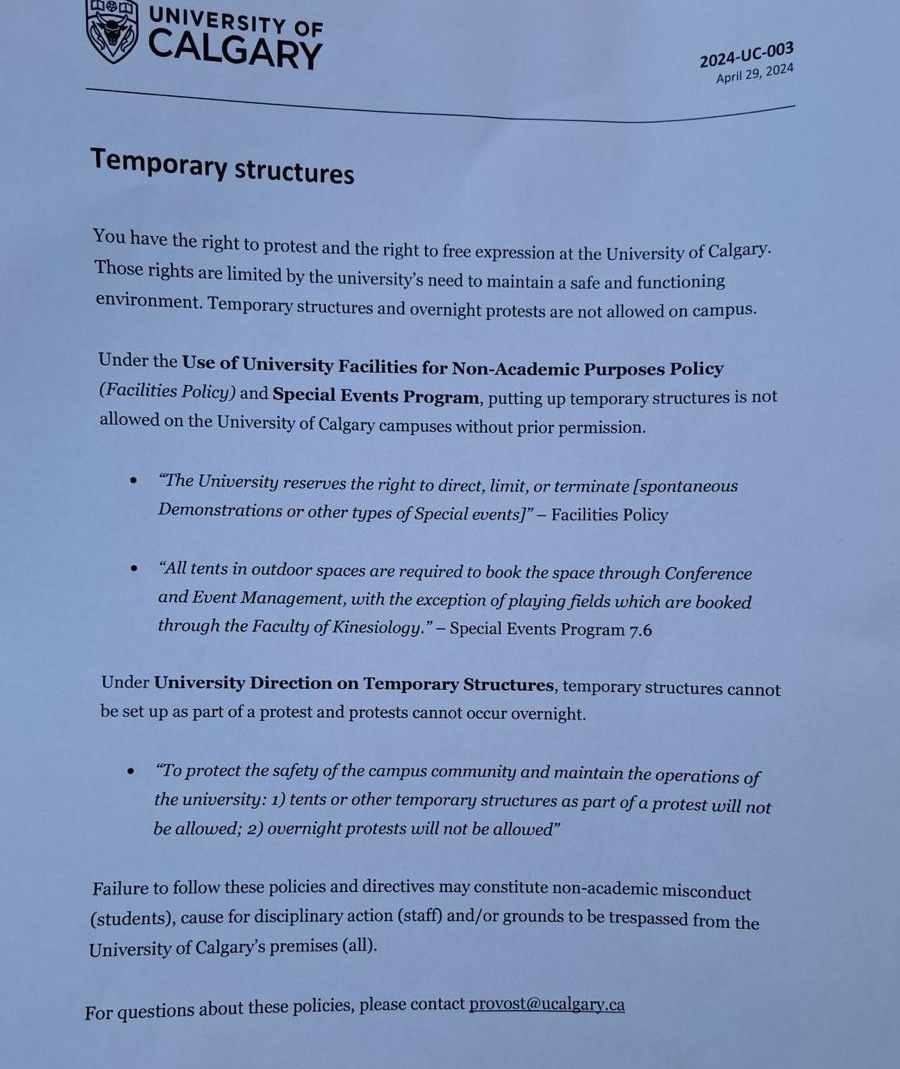
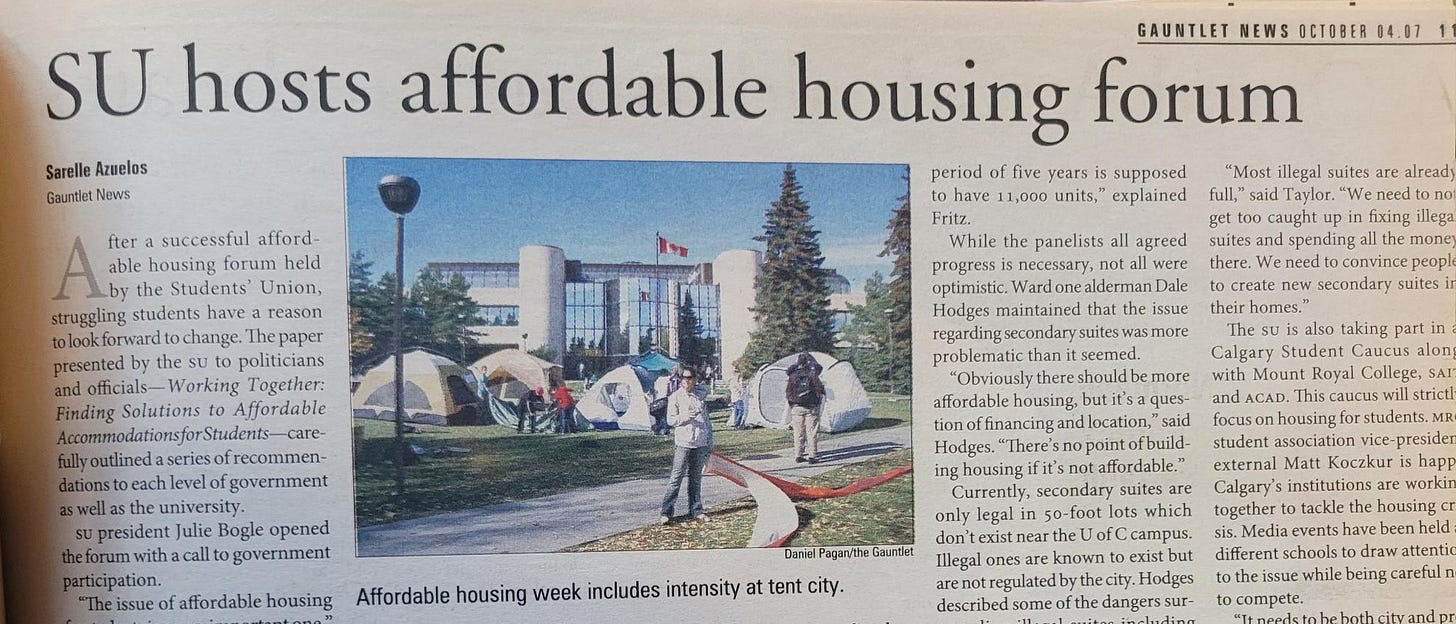


"If it hadn't been cracked down on in the way it had, I think something pretty remarkable could have emerged out of that—like a hub of political and human rights, community building. But it wasn't to be.” Makes a mockery of the slogan, "Start Something", which appears on campus and on some of the FOIPed documents.
Thank you, Orchard, for sticking with this story.
Banger of a piece, Jeremy.